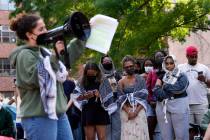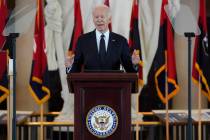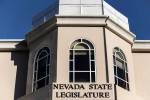Voters again asked to approve Web taxes
CARSON CITY -- Sometimes, you wonder why state legislators can't get the message that residents don't always want what the lawmakers think is good for them.
By nearly a 3-to-1 margin, voters rejected a ballot question in 2008 to make it easier for the state to levy taxes on Internet sales.
Landslide defeat aside, virtually the same question will be back on this November's election ballot as Question 3.
Voters will be asked whether to let legislators change tax laws "to resolve a conflict with any federal law or interstate agreement" dealing with collection of sales taxes. Now the Legislature needs voter approval to make such changes.
Although the word "Internet" never is mentioned in the measure, the purpose of Question 3 is to let the state collect sales taxes on Internet purchases made by its residents as soon as possible after Congress gives it that authority.
Otherwise, Internet taxes could not be collected until after voters approve such collection during the next general election. That could be more than a year away.
Nevada lost more than $114 million last year in sales taxes on Internet purchases. Those losses will increase to more than $330 million by 2012, according to the National Conference of State Legislatures.
The federal government now prohibits states from forcing Internet sellers to collect sales taxes, except in cases in which the seller also has a physical presence in the state.
Costco will collect sales taxes if you buy a shirt from its Internet website. But you don't pay sales taxes on the same shirt if you buy it from someone on eBay.
"Now we have a situation where Main Street businesses must collect the 7 percent to 8 percent in sales taxes, while e-commerce businesses do not," said Assemblyman James Settelmeyer, R-Gardnerville. "It places our businesses at a significant disadvantage. Give mom and pop businesses a fair chance to compete."
Settelmeyer introduced the bill that put Question 3 on the ballot. His bill passed the Legislature unanimously.
The word Internet was omitted from the ballot question because of the possibility that under future technology, another way of selling items will become popular, and the state might need quickly to impose sales taxes on it, he said.
During hearings on Settelmeyer's bill, Assemblywoman Kathy McClain, D-Las Vegas, offered her opinion why voters rejected the question in 2008 and could again in November.
"They saw two words together, 'Legislature' and 'taxes,' and said no," she said.
Settelmeyer said that might happen again unless businesses, chambers of commerce and others get out and sell the voters on the need to vote yes.
States have been trying for years to persuade Congress to force Internet sellers to collect sales taxes. They created the Streamlined Sales Tax Project, a band of states working together to come up with a uniform plan to levy sales taxes on Internet sales.
To this point, Congress has rejected their efforts.
Rep. William Delahunt, D-Mass., introduced the Main Street Fairness Act on July 1 designed to require sellers to collect state sales taxes on all Internet sales and forward the money to the states.
Nevada Taxation Director Dino DiCianno, the state representative on the Streamlined Sales Tax Project board, said he does not know whether the act will win approval.
But DiCianno said that most states are suffering budget woes and that implementation of the act would provide them a lot of money.
Settelmeyer emphasized that a yes vote is not a vote to increase taxes because the sales taxes rates already are in place.
He said Nevadans also have been required by law for years to pay sales taxes on Internet purchases.
But DiCianno said the state cannot force buyers to pay the taxes because it is an interstate commerce issue that Congress must decide.
Nevada cannot enforce its law until Congress acts on the Main Street Fairness Act, he added.
"It is strictly voluntary," DiCianno said. "The (Main Street Fairness Act) will require those who sell to you to collect the tax upfront and remit it to us. The best thing Congress could do to help the states is pass this bill."
Contact Capital Bureau Chief Ed Vogel at evogel@reviewjournal.com or 775-687-3901.
State explanation, arguments and fiscal note on Question 3























